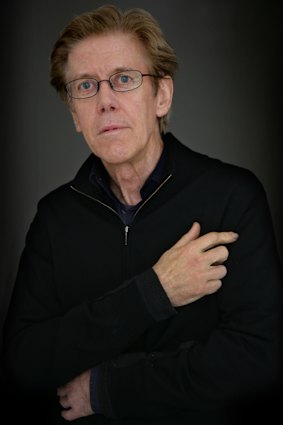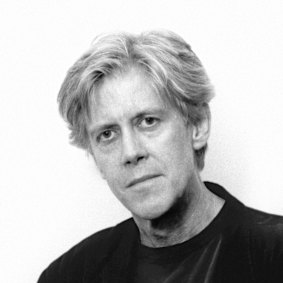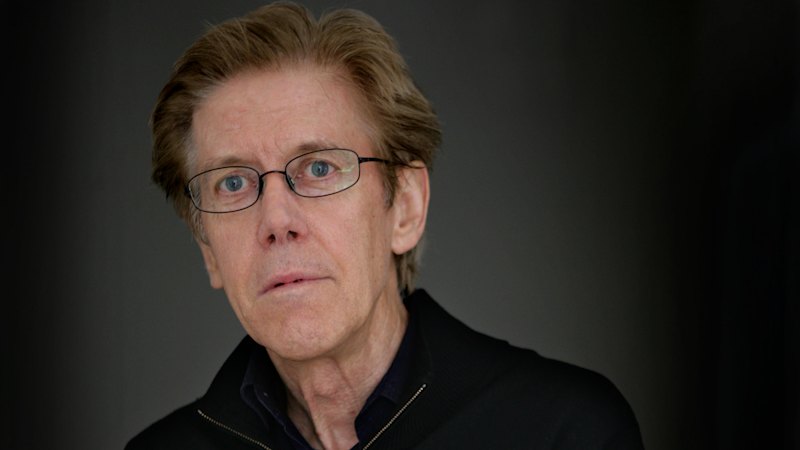A steep descent. The visceral racket of gears across the landscape. This is more than a still life. It is arrested motion and an unknown man is driving the truck in pre-dawn hours.
Yes, a truck driver! Gray put people in his poems, and was more than an Imagist. He was a great humanist who loved his friends, and shared his friends with his friends, and was loved by them all.
Gray, aged 80, died of complications from Parkinson’s disease on November 17.
Dee Jones, his partner of more than 50 years, slept beside him in a small bed during his final days in palliative care, and was with him five hours every day for his last 11 months, feeding him by hand at Uniting Illowra in Waverley, where he found secure accommodation with help from a friend – writer Peter Goldsworthy – and from MP for Vaucluse Kellie Sloane. Tom Carment, the painter, was frequently at his bedside.
During these harrowing months, he had limited speech but his mind was alert and lucid.
Loading
In his last weeks, morphine controlling his pain, Dee read to Robert from Chekhov, his favourite author, who is quoted several times in Gray’s poem The School of Venice – one of the great humanist poems in our language.
Typically for Gray, the main subject of this poem is people – in particular the marriage in Venice of a close friend, the English poet and translator Michael Hulse. This poem is an acute disquisition on humanism, interspersed with striking descriptions of the “seething powdery, sifted light” of a great city sinking into its canals. The School of Venice may be Gray’s greatest poem.
Others great works include In Departing Light, the astonishing and loving poem about the dementia of his mother, a Jehovah’s Witness, or Dyptich, the poem about his father, a classicist with “wary small eyes and thin lips” who could never forget he was “a gentleman”. In this poem, his father, drunk “after the pubs had closed”, drives his car down a hillside of banana palms – “the car reared high on a great raft of mutilated, sap-oozing fibre; from which he climbed down … soberly polite”.
Gray’s greatness as a poet has been prolific. Twenty-four poets, literary critics and friends each wrote essays about 24 of his poems in the tribute volume Bright Crockery Days, published by Mark Tredinnick in 2024. While prolific, Gray did not overwhelm with an unreadable bulk of poetry and was scrupulous in maintaining the tightness and vividness of his language.
If his writing had a flaw, it was that he was sometimes too scrupulous, whittling away at poems and revising some of them too often.
Robert was my close friend for 56 years. I met him in 1969 after a fractious meeting of the Poetry Society. I walked out of the meeting hall into the night, and a young man was standing on the darkened pavement in George Street, close to Circular Quay. He seemed anxious to speak to me. He introduced himself as Robert Gray and told me he wrote poetry. We agreed to meet later that week.
For our first couple of meetings he called me Mr Lehmann. I was only five years older and, embarrassed, soon persuaded him to call me Geoff. We met often – sometimes for lunch in an Italian restaurant in the city. Afterwards, as we walked out in the street, I noticed young women would quickly glance at us. This was an entirely novel experience. They were looking at Robert, his shy film-star looks – not me. I enjoyed their surreptitious glances. I suspect he was not even aware of them.

Gray was said to be “one of the contemporary masters of poetry in English”.Credit: Marco Del Grande
Gray was born in Port Macquarie in 1945 and grew up on near Coffs Harbour. An early influence was Ted Hillyer, who lived in Bellingen, a great, unrecognised Australian realist painter of landscapes, and later his dear friend.
Gray’s early experiences are recorded in his luminous memoir The Land I Came Through Last (2008); his years growing up on the NSW North Coast; of later working in Sydney as a journalist, copywriter, mail sorter and bookshop assistant; and finally his friendships with writers, among them Patrick White, Murray and Kenneth Slessor.
He recalled when he was 12, a teacher read to the class a passage from The Window In The Willows, describing how the butter on Mole’s hot toast dripped like honey from the honeycomb.
“With that image,” he writes, “I was aware that I had just seen something in imagination more intensely, more sensuously, than I ever had in life. I was always very conscious of being sensuously overwhelmed by the world and the vividness of it was very exhilarating to me. Sort of a Wordsworthian response. That was my main recourse when I was young – the exhilaration of looking.”
His first book of poems, Creekwater Journal, was published in 1973. Gray published 13 books of poetry, and he and I went on to co-edit three anthologies of Australian poetry.

Gray, pictured in 2002, published 13 books of poetry.
Gray’s work has been awarded all the most important Australian literary prizes, including the NSW Premier’s Poetry Award, the Victorian Premier’s Award for Poetry, the Patrick White Award, the Adelaide Festival of the Arts Award, the Grace Leven Poetry Prize, the Age Poetry Book of the Year Award and the CJ Dennis Prize for Poetry.
Gray was not an unworldly poet but a discriminating observer, and he had no interest in money, working much of his adult life in bookshops. Although a religious sceptic, his interest in Zen Buddhism prompted a move to Tokyo for six months with Dee and his step-daughter, Harriet Jones.
Loading
Robert fondly remembered Harriet jumping on the floor of the apartment where they lived at the exact moment when the building was convulsed by an earthquake. He kept a photograph of Harriet on his desk, and a photograph of Walt Whitman on the wall of the room where he died.
Les Murray was moved to write that Gray “has an eye, and the verbal felicity which must accompany such an eye. He can use an epithet and image to perfection and catch a whole world of sensory understanding in a word or a phrase”. He later noted “Gray is one of the contemporary masters of poetry in English”.
He is survived by Dee and Harriet, his siblings, Billy and Alicia, and his many friends including his agent, Margaret Connolly, editor John Carrick and poets Jamie Grant, Stephen McInerney, Judy Beveridge, Todd Turner, Luke Fischer, Jemal Sharah, Petra White and many others to whom he gave unstinting support.
Start the day with a summary of the day’s most important and interesting stories, analysis and insights. Sign up for our Morning Edition newsletter.

